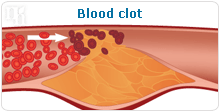Hormone replacement therapy (HRT) is the name given to an artificial hormone treatment that is capable of treating women with hormonal imbalances. The treatment is considered to be one of the most effective of its kind, but it isn't without expense or incumbent risks. An HRT study is a series of research trials designed to determine the precise risks and benefits of HRT to individual patients.
Existing HRT Study

An existing study has found that the risks involved in women using HRT as a treatment method for osteoporosis can come with a certain degree of risk. The study found that, because it tries to replicate human hormones, the dissimilarities that exist in these hormones can cause complications in the human body. Such complications have been known to include breast cancer and troubles with blood clots.
HRT Study: The 1991 National Institute of Health (NIH)

Due to the prevalent use of HRTs in America, The National Institute of Health (NIH) sought to precisely quantify the risks and benefits of the treatment in their 1991 study. Via the Women's Health Initiative (WHI), they launched the largest study of its kind. The short lived study, which was cancelled in 2002, showed a number of troubling results; these results were responsible for the drop in popularity of HRT around the same time period. The study proved conclusively that it was capable of causing an increased risk of the following conditions in women:
- Breast cancer
- Ovarian cancer
- Heart disease
- Blood clots
- Strokes
HRT Study into Alternatives for Treating Hormonal Imbalances
The Origin of HRT
Subsequent HRT studies have shown that other treatment methods can be used to manage menopause symptoms such as osteoporosis. One study found that bisphosphonates and calcitonin are capable of slowing down bone loss while teriparatide can increase bone formation.
What Alternatives Exist for Menopausal Women?
Due to the negative nature of the HRT study, many women are inclined to look for an alternative approach in the treatment of their menopause symptoms. Such alternatives can include:
- Phytoestrogenic supplements. Phytoestrogenic herbs contain phytoestrogens, which are plant compounds that mimic the effects of human hormones in the body.
- Hormone-regulating supplements. This variety of herbs function by encouraging women's hormone receptors into producing more hormones and contain none of the phytoestrogens that can cause a multitude of side effects in women.
HRT is used by many menopausal women around the world to treat their menopause symptoms. However, studies have found that hormone therapy comes with a variety of side effects which can be dangerous to women's health. It is advised that women consider all of the alternatives to HRT before they consider the invasive treatment of hormone replacement therapy.


